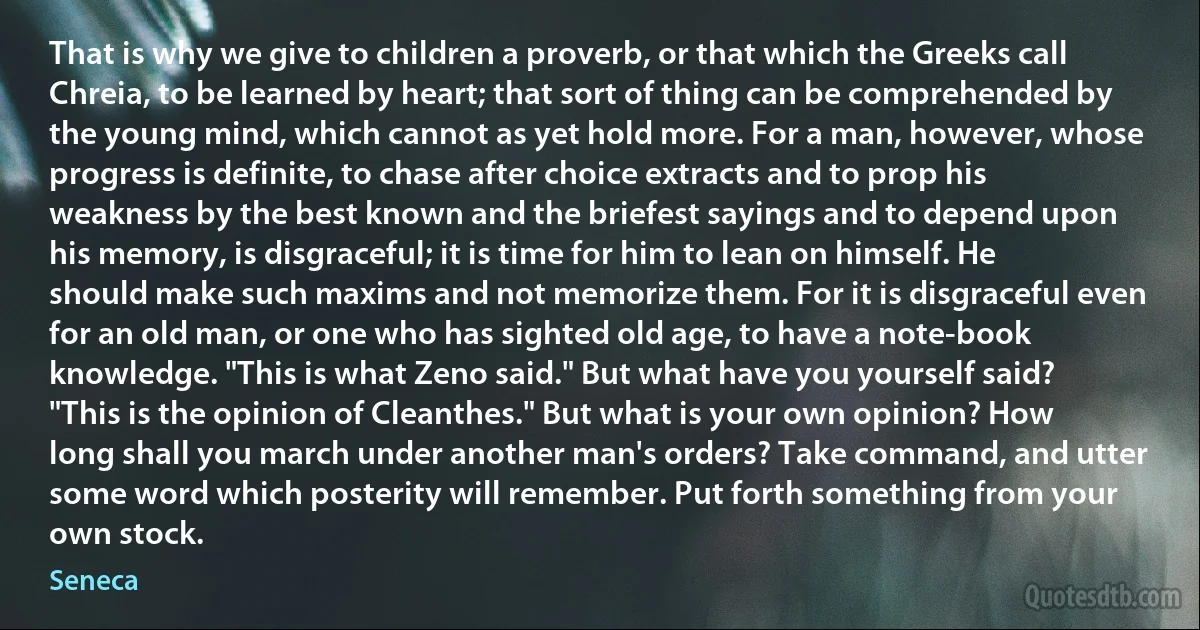
That is why we give to children a proverb, or that which the Greeks call Chreia, to be learned by heart; that sort of thing can be comprehended by the young mind, which cannot as yet hold more. For a man, however, whose progress is definite, to chase after choice extracts and to prop his weakness by the best known and the briefest sayings and to depend upon his memory, is disgraceful; it is time for him to lean on himself. He should make such maxims and not memorize them. For it is disgraceful even for an old man, or one who has sighted old age, to have a note-book knowledge. "This is what Zeno said." But what have you yourself said? "This is the opinion of Cleanthes." But what is your own opinion? How long shall you march under another man's orders? Take command, and utter some word which posterity will remember. Put forth something from your own stock.
SenecaRelated topics
age best call chase children choice command definite forth heart hold known knowledge lean man march memory mind opinion prop proverb say should something sort take thing time under weakness word yet youngRelated quotes
I do not mean to say that formal economic analysis is worthless, and that anybody's opinion on economic matters is as good as anyone else's. On the contrary! I am a strong believer in the importance of models, which are to our minds what spear-throwers were to stone age arms: they greatly extend the power and range of our insight. In particular, I have no sympathy for those people who criticize the unrealistic simplifications of model-builders, and imagine that they achieve greater sophistication by avoiding stating their assumptions clearly. The point is to realize that economic models are metaphors, not truth. By all means express your thoughts in models, as pretty as possible (more on that below). But always remember that you may have gotten the metaphor wrong, and that someone else with a different metaphor may be seeing something that you are missing.

Paul Krugman
Were we required to characterise this age of ours by any single epithet, we should be tempted to call it, not an Heroical, Devotional, Philosophical, or Moral Age, but, above all others, the Mechanical Age. It is the Age of Machinery, in every outward and inward sense of that word; the age which, with its whole undivided might, forwards, teaches and practises the great art of adapting means to ends. Nothing is now done directly, or by hand; all is by rule and calculated contrivance. For the simplest operation, some helps and accompaniments, some cunning abbreviating process is in readiness. Our old modes of exertion are all discredited, and thrown aside. On every hand, the living artisan is driven from his workshop, to make room for a speedier, inanimate one. The shuttle drops from the fingers of the weaver, and falls into iron fingers that ply it faster.

Thomas Carlyle
The priesthood have, in all ancient nations, nearly monopolized learning. Read over again all the accounts we have of Hindoos, Chaldeans, Persians, Greeks, Romans, Celts, Teutons, we shall find that priests had all the knowledge, and really governed mankind. Examine Mahometanism, trace Christianity from its first promulgation; knowledge has been almost exclusively confined to the clergy. And, even since the Reformation, when or where has existed a Protestant or dissenting sect who would tolerate [a free inquiry]? The blackest billingsgate, most ungentlemanly insolence, the most yahooish brutality is patiently endured, countenanced, propagated and applauded. But touch a solemn truth in collision with a dogma of a sect, though capable of the clearest proof, and you will soon find you have disturbed a nest, and the hornets will swarm about your legs and hands, and fly into your face and eyes.

John Adams
I seek a light that shall be new, yet old, the oldest indeed of all lights.... I seek not science, not religion, not Theosophy, but Veda-the truth about Brahman, not only about His essentiality, but about His manifestation, not a lamp on the way to the forest, but a light and a guide to joy and action in the world, the truth which is beyond opinion, the knowledge which all thought strives after-yasmin vijñate sarvam vijñatam [which being known, all is known]. I believe that Veda to be the foundation of the Sanatan Dharma; I believe it to be the concealed divinity within Hinduism,-but a veil has to be drawn aside, a curtain has to be lifted. I believe it to be knowable and discoverable. I believe the future of India and the world to depend on its discovery and on its application, not to the renunciation of life, but to life in the world and among men.

Sri Aurobindo
I shall present a theory - which I call "the theory of the managerial revolution." During the past century, dozens, perhaps even hundreds, of "theories of history" have been elaborated. All of the theories, with the exception of those few which approximate to the theory of the managerial revolution, boil down to two and only two. The first of these predicts that capitalism will continue for an indefinite, but long, time, if not forever:' that is, that the major institutions of capitalist society, or at least most of them, will not be radically changed. The second predicts that capitalist society will be replaced by socialist society. The theory of the managerial revolution predicts that capitalist society will be replaced by "managerial society," that, in fact, the transition from capitalist society to managerial society is already well under way.

James Burnham
